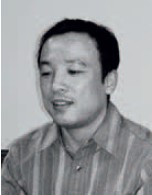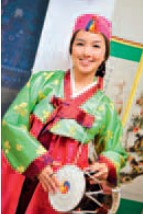
PART 4
KOREA’S INTERNET MANIA
Korea has the fastest broadband speeds in the world, as anyone in this country will be able to tell you. But that’s just the beginning. the Internet has changed Korea in deep ways, and birthed a whole range of extraordinary social phenomena that cannot fail to surprise outsiders.
THE POWER OF THE INTERNET
Since the dawn of the Internet age, there has been endless discussion in Korea about the power of the “netizen.” As the name would suggest, a netizen is simply an Internet user. But the word also tends to conjure up someone who inhabits online forums, offering opinions and spreading negative press and misinformation about celebrities, politicians, and any other high-profile person unlucky enough to earn his ire.
Korea is a society in which outspoken, public criticism is generally taboo. If you attack someone publicly, you can expect them to take it very personally. Perhaps because of this, laws on libel and slander are extremely strict. The Internet, though, allows for a strong degree of anonymity, breaking through the taboo. The online forum gives the angry netizen a way to vent without consequence. Thus it has become common for celebrities to earn “anti-fans”—people who have nothing better to do than entertain themselves by grouping together and attacking famous people.
POLITICAL CLOUT
One of the most popular websites in Korea is called Ilbe. Its users—so-called “Ilbe Bugs”—are known as far-right fanatics who love nothing more than expressing sexist opinions about women, swearing, and spreading rumors. But the fact that there are around a million Ilbe Bugs means that collectively, they have a certain level of influence in society. They are also known for their insult war with members of the Ddanzi Ilbo website, who have politically opposing views.
Online political clout works in both directions, though. In 2002, liberal candidate Roh Moo-hyun was trailing Lee Hoi-chang (of the Grand National Party, now Saenuri), and few expected him to win. However, a group of netizen fans calling themselves Nosamo (people who love Roh Moo-hyun) mounted an all-out online campaign to encourage young people to vote for their hero. Mr. Roh ended up as President Roh, claiming victory by a margin of two percent.
MINERVA UNMASKED
Some netizens have even gained hero status for themselves. A man nicknamed “Minerva” became known as a kind of economic prophet in 2008, after posting a series of gloomy predictions about the Korean currency and stock markets. He was correct often enough to gain a massive following, and terrified the government with further prognostications about the collapse of the Korean won. Financial policymakers in Korea are extremely sensitive to criticism, and so an investigation was set up to unmask Minerva’s identity. Minerva was well-versed in economic theory and the state of the Korean economy, so there were many who believed him to be a senior bank executive or government insider. However, he turned out to be one Park Dae-sang, a thirty-year-old unemployed man who still lived with his parents. Regardless, the government prosecuted him on charges of “spreading false information.” In a victory for civil liberties, the government lost in court. Mr. Park later ending up getting a job as a newspaper columnist.
Your online enemies know who you are, but you don’t know who they are. Anonymity is the best friend of the angry netizen.
The Case of Tablo
In 2010, a bizarre controversy over the educational background of a popular Korean rapper, Tablo, began to rage. Tablo is a graduate of the prestigious American university, Stanford—but a group of netizens (whose ranks eventually swelled to 190,000) did not believe him, and began to harass him. They accused him of lying, and made all manner of spurious allegations that even reached the front pages of the national papers.
ANT INVESTORS
There are millions of amateur investors in Korea, who trade online. Professionals disdain them with the nickname gaemideul (ants). The typical gaemi investor is a housewife, or a company worker who slacks off from his duties and plays the stock market instead. Over time, almost all of them lose money, according to research by Samsung Securities, as quoted in The Hankyoreh newspaper.
There are many legendary stories about gaemi investors and the people who take advantage of them. A cheeky company boss even issued a press release saying that top actress Lee Young-ae had invested in his firm’s stock; the first she heard about that was when she picked up a newspaper and read about it on a flight out of Incheon Airport. That did not stop the stock from rocketing, though.
One unscrupulous businessman I met in the mid-2000s actually made it his business to take over small companies and hype them up—announcing their entrance into “hot” markets like education or e-commerce—to draw gaemi investors in. Once the price had gone up enough, he would simply sell everything.
Such behavior exists wherever there are stock markets. But in Korea, the sheer popularity of rumor-laced online forums makes for particularly rich pickings for scammers.
TO THE MOON AND BACK
In 2011, politician Moon Jae-in began to be considered a serious candidate for the 2012 presidential election. Some trickster circulated a picture of Mr. Moon online, showing him sat with a man identified as the CEO of a small clothing firm named Daehyun. The photo was accompanied by text stating that if Mr. Moon became president, it would obviously be positive for Daehyun stock—since he was such good friends with the CEO.
Political “theme stocks” such as Daehyun are known to rocket when the connected politician’s fame rises. It is certainly unclear whether such a link to the president would enable them to sell more clothes, but in any case, the man in the picture was not even Daehyun’s CEO! However, that did not stop the stock from increasing over 200 percent in a matter of weeks.
Daehyun eventually fell back to its original price, causing big losses to those gaemi investors who bought in after the rumor started. As for the man who started the rumor, why do you think he did it? He had been quietly buying up Daehyun stock for weeks, and after the rumor came out, he was able to sell for a profit of around a billion won (almost a million US dollars). The authorities did catch up with him later, though.
THINK YOU CAN DO BETTER?
On the positive side, there are a lot of excellent companies in Korea, and many are undervalued on the stock market. An investor can actually do very well by doing a little research and of course, avoiding the up-and-down gaemi stocks.
Online brokers in Korea are also very fast, efficient, and cheap. I sometimes invest in Korean stocks, and buy them through an online brokerage that charges me about 1,000 won (US$1) per trade. So if you think you can do better than the gaemi-deul, why not come and try it for yourself?
A Lucky Gentleman Indeed
Remember “Gangnam Style”? There are certainly many small investors who do. Psy’s father is the owner of a stock exchange-listed company named DI, and when the horse dance became a global phenomenon in August and September 2012, the price of DI stock shot up by almost 500 percent. It later came back down to earth, causing losses to those who bought in too late. There was no genuine reason for DI’s big move. DI makes semiconductors, and experienced no benefit from “Gangnam Style.” But small investors in Korea, who spend all day online checking out the latest rumors and fast-action stocks, love to buy such jakjeon-ju (“mission” stocks) in search of a quick profit. In the run-up to Psy’s follow-up single “Gentleman,” DI stock went through the roof once again!

THE VIDEO GAMER’S SECOND HOME
When I first lived in Seoul back in 2004, I found it hard to get my bearings in this gigantic city of 10, 14, or 25 million people (depending on how you measure it). So, I was constantly asking people for directions. If I asked a foreign friend, they would sometimes joke, “Turn left at the PC-bang, then take that road until you see another PC-bang, then turn right, and you’ll find it on the first floor of the building with that big PC-bang.” Or something like that. In 2008, there were 22,000 such places in Korea.

THE PC-BANG: WHAT IS IT?
On one level, the PC-bang is simply an Internet cafe. You go in, pick up a code number at the front desk, and sit down at one of many identical computers lined up in rows. After entering the code, you are free to use the Internet for as long as you like. And when you are done, the code system lets the manager know how much time you used, so he knows how much to charge you. One hour should cost somewhere between 1,000 and 2,000 won.
But what made PC-bangs spring up on every street? The PC-bang story is inseparable from the rise of online gaming. For over a decade, Korean teenagers have been obsessive players of MMORPG games, including many Korean-made titles like Maple Story, Starcraft, and Lineage. And perhaps because Korea is a “collective” society, people sometimes don’t want to play alone. Going with friends to a PC-bang and competing against each other in an MMORPG—whilst being able to yell “Ha! You lose!” directly into their ear—is a fun and cheap way to spend an afternoon.
PC-BANG ADDICTS
There are many infamous instances of people taking their PC-bang addiction too far. While it is considered problematic that there are kids playing hooky from school and spending the day in a PC-bang, the stories that generate the most headlines are more extreme. There was a tragic case in 2010 involving a couple whose baby daughter starved, because they spent so much time in the PC-bang that they neglected to feed her. Ironically, the game they were playing involved raising a “virtual child.” And there have been other cases of gamers suddenly dying after 48-hour gaming sessions without sleep or food.
For most people though, the PC-bang represents good, honest fun. It is a place to forget about the stress of school and work life by blasting away at monsters. There are also those who use the PC-bang for Internet dating: during the mid-2000s, meeting websites like Sayclub grew in popularity, and one could often see PC-bang users video-chatting to strangers or even arranging beongae—sudden face-to-face meetings.

The sign for bang in PC-bang. Bang simply means “room.”

If you see the letters “PC” on a building in Korea, you can be 99 percent certain that you’ve arrived at a PC-bang.
END OF THE ROAD?
Perhaps sadly, the PC-bang is in decline these days. Increased government regulation due to gaming addiction, the growth of public Wi-Fi in cafes, and the rise of smartphone-based gaming, pushed their numbers down to around 15,000 by 2010. I suspect that there are even fewer now. If you do visit Korea, make sure you spend an hour in a PC-bang—they are a great Korean institution, and one that might not be around forever.
THE DECLINE AND REBIRTH OF PROFESSIONAL COMPUTER GAMERS
Throughout the early and mid 2000s, Starcraft (made by Blizzard Games) was by far the top game in Korea. Starcraft contests were broadcast on TV, and its top players made fortunes; no other game could come close in terms of popularity and influence. At the top of the Starcraft pyramid stood Ma Jae-yoon, a man so gifted that the rules of Starcraft had to be changed to make it harder for him to win—though even then, he still did. Fans called him “Maestro,” and one TV commentator even called him “God.”
E-sports contest
All this makes what happened in 2010 even more shocking. Ma Jaeyoon and ten other players were caught fixing Starcraft matches. Why? Although sports gambling is illegal in Korea (other than in strictly regulated government-controlled betting shops that most gamblers don’t use)—there are many illegal websites offering odds on all sporting events, including Starcraft. They are run by Korean exiles from places like the Philippines. There is therefore a great incentive to form match-fixing syndicates, as has also happened recently in the Korean football and baseball leagues.
The image of Starcraft had been sullied. Fans didn’t know if they could believe what they were watching any more. The popularity of the game declined, and since Starcraft was the flagship e-sports game, it seemed that professional e-sports itself might die.
E-SPORTS TODAY
Luckily, the vacuum was filled by a new game, League of Legends. Its maker, Riot Games, deliberately set out to make a Starcraft-replacing, dominant game, according to “The Korean” of Ask a Korean, probably the best English language blog on Korean culture. Eleven thousand people bought tickets to watch a single League of Legends tournament in 2012, so it is safe to say that Riot Games are on course to achieving their aim. Professional e-Sports may never fully relive its Starcraft-driven golden age. But still, there remain three cable TV channels offering coverage of professional gaming leagues. Competition for front row seats at contests like the annual World Cyber Games—which started in Korea and is still dominated by Korean players—is intense. Players must sit in soundproofed glass cages, so that the screams of the crowd do not distract them.
Slay a Dragon, Become a Millionaire
South Korea has become famous, notorious even, for the enthusiasm of its people for computer games. It is perfectly normal here for twenty- and thirty-something men and women to spend hours on MMORPG games. These days, smartphone gaming is also taking off: travel on any metro train or bus, and you will find that at least half of the passengers will be fiddling furiously with an iPhone or Galaxy S, lining up diamonds in rows, or shooting at aliens.
Some take gaming to great extremes. The government has poured tens of millions of dollars into anti-gaming addiction programs. Tales are legion of youngsters who bunk off from school to spend all day playing Counterstrike, Maple Story, or Sudden Attack in their local PC-bang, and throw violent tantrums when their parents try to stop them. But sometimes, these anti-social super-geeks end up as heroes.
The very best gamers in Korea make six-figure incomes. Their faces are emblazoned on posters in children’s bedrooms up and down the land. Without any trace of irony, fans call them “e-Sports athletes.” Top gamers form teams and attract sponsorship; chaebols of course have the deepest pockets so there are Samsung, SK Telecom, and STX teams who participate in Korean e-Sports Association (KeSPA) leagues.

Global Starcraft 2 League; Ma Jae-yoon in action; an Azubu team member competes at a League of Legends competition.
GOOGLE-BLOCKERS: KOREA’S WORLD CLASS INTERNET COMPANIES
When it comes to top Internet businesses, Silicon Valley still rules the roost. But as may be expected for a country that has the world’s fastest broadband and legions of online game maniacs, Korea has a few heavyweights of its own.
Lee “MarineKing” Jung Hoon and his teammates from team Prime during a match against team oGs.
MarineKing
In 2012, one famous Starcraft player, MarineKing (Lee Jung-hoon), became the subject of an in-depth CNN report. For years, Mr. Lee battled with his parents over his desire to be a professional gamer. They wanted him to grow up to become a judge. He eventually won, and at the age of just nineteen, he is now one of around 700 people in Korea to make a living from pro gaming. He earns around US$100,000 per year, and is besieged by autograph hunters at competitions.
That figure puts MarineKing in the top five percent of pro gaming earners. As with other sports, only the very best make real money. There are some who make more: MarineKing’s big rival MVP (21-year old Jung Jong-hyun) makes around a quarter of a million. And even back in the early 2000s, legendary player Lim Yo-hwan was making around US$300,000 per year in sponsorship and winnings.
NHN You may not have heard of NHN. But it has a stock market valuation of around US$12 billion, as a result of its power in online search and games. Its most famous service is the search engine and portal naver.com, which dominates the market in Korea. In most countries, Google has displaced local competitors, but not here. Why is this? One NHN investor told me, “People doubted Naver, but I searched it for bi (the Korean word for “rain”) one day, and it came back with lots of information about the pop star (Rain). I did the same on Google, and it just told me about the weather. So then I realized Naver understands Korea.” He also notes that the “busy” design suits Korean tastes, in comparison to Google’s minimalist layout.
NCSoft and Nexon NHN has also been selling online games since 1999, through its Hangame portal. But who develops the games? The leaders in this field are NCSoft and Nexon. NCSoft was founded by Kim Taek-jin in 1997, and is responsible for hit games like Blade and Soul, Lineage, and Guild Wars. Mr. Kim sold a big stake in his firm to rival Nexon in 2012.

The game-maker Kim Taek-jin.
Nexon has introduced its own virtual currency, NX-Cash, which game players use to trade “virtual items” such as swords, shields, and special powers. This has made Nexon one of the pioneers of “free-to-play” or “freemium” gaming, in which players can experience the basic functions of the game, but upgrade their experience by making (hopefully frequent) small payments. This has proven a highly successful business model, with Western gaming giants now adopting it themselves (Nexon made over US$500 million in 2012, on the back of huge profit margins). Nexon’s most famous games include Kart Rider, Maple Story, Sudden Attack, and Counter-Strike.

Daum Another notable firm is Daum (“Next” in Korean), which used to be the leader in search engines, but ended up losing its position to Naver. Daum still operates Hanmail though, the country’s most popular email service. Its virtual “cafes” serve as meeting rooms for people with shared interests from politics to home-brewing—this has given Daum a certain amount of social power in Korea.
Daum bosses caused a huge surprise in 2004 by moving their headquarters from Seoul to Jeju Island. Some workers hated this at first, but ended up getting used to the beautiful scenery and cheaper living. In the years to come, I think Daum will be seen as an innovator for pioneering the move away from the capital—something that this seriously Seoul-centric country would benefit from.
VCNC and the Second Wave
NHN, Daum, and NCSoft are all part of the “first wave” of Korean Internet firms. In the 2010s, a “second wave” began to emerge. KakaoTalk (see below) is probably the most successful of these. The one I find most interesting, though, is Value Creators & Company (VCNC), who have developed a “social network for couples,” that allows the besotted to share romantic messages and photos, and reminds them of anniversaries and other special dates. They have around four million registered users, and recently attracted US$3 million of venture capital investment from Japanese goliath Softbank.

Daum’s HQ, which is considered one of Korea’s most impressive buildings.
Dog Poo Girl and Friends
Around half the Korean population uses smartphones. The era of the phone-that-is-also-a-computer has many implications for all of us. For example: you can no longer expect to do anything silly or embarrassing in public without someone secretly filming it. And because Koreans love the Internet and social media, a video taken of you doing something sufficiently amusing will go viral before you can say “Gangnam Style.”

The so-called “smoking woman” of the Seoul Metro.
BE CAREFUL WHAT YOU DO ON THE METRO!
As may be expected then, Korea has a number of reluctant cyber-celebrities who came to public attention by doing stupid things. The Seoul Metro seems to be a breeding ground for this. The most (in)famous case was that of the delightfully-named “dog poo girl,” who took her pet on the subway, and allowed it to defecate in the carriage. Though challenged by other subway users, she refused to clean up its mess. Unbeknownst to her, the whole incident was being filmed by another passenger.
A few hours later, “dog poo girl” was one of the most-searched topics on the naver.com portal. Netizens conducted a vigilante-type search to uncover her identity. After being “outed,” the young woman quit her university and went into hiding, unable to cope with the torrent of abuse unleashed at her, both online and by people who recognized her in public.
Other famous Seoul Metro cases include that of a woman who drank soju and smoked cigarettes in front of other passengers; a drunken old man who asked a short-skirt clad young woman to participate in group sex with him; and a woman who took her clothes off in the carriage. All of these people were the subject of netizen witch-hunts.

Louis Vuitton bags, regulation issue for the so-called doenjang-nyeo.
DOENJANG-NYEO AND THE SEXISTS
One important point about viral infamy in Korea is that the subject is, more often than not, a woman. “Sexual harassment Granddad,” as the website Koreabang.com calls the old man in the above example, is an exception. The reason for this apparent sexism is that a significant proportion of angry netizens (such as “Ilbe Bugs”) are young men who cannot find girlfriends.

Such netizens are especially fond of criticizing the young women they fail to attract as doenjang-nyeo (“bean-paste girl”). This word comes from the notion that there are many materialistic women who are so devoted to buying luxury handbags and other showy accessories that they can afford to eat only the cheapest foods, such as doenjang-jjigae (bean-paste stew). This is no longer just an Internet word, though: doenjangnyeo has crossed into the mainstream, and can now be used to describe any young lady who thinks she is a princess.
NETIZEN SLANG: EOLJJANG OR ANYEODWAE?
Many examples of netizen slang have crossed over into mainstream society. The eoljjang of the title is one such word. Eol is the first syllable of eolgul, the Korean word for “face,” and jjang simply means “great,” or “awesome.” So, an eoljjang is simply someone who is extremely beautiful or handsome. There is also momjjang—mom means “body.”
When these two words took off, there developed a fad for posting up photos of models, actors and actresses, and members of the public, on online forums; this was done to determine by netizen consensus who was the greatest eoljjang or momjjang. Among Korean actresses, Jun Ji-hyun would be considered an ideal example of the former, and Kim Hye-soo the latter.
Everyone in Korea knows these two words. But fewer know anyeodwae, which has a rather cruel, and opposite, meaning. This one is a contraction of the Korean words for “spectacles,” “acne,” and “pig.” Perhaps thankfully, it did not become a mainstream word. Here are some other examples of Internet slang.
Internet Slang
Though it takes me a while, I can read a Korean newspaper. Unfortunately, I have much more serious difficulty deciphering the content of online forums, Twitter messages, and Daum “cafe” posts. This is due to the huge amount of slang and Internet-specific vocabulary that Korean Internet users employ.
2MB This refers to former president Lee Myung-bak. The number “2” in Korean has the same pronunciation as “Lee,” and the “MB” comes from “Myung” and “bak.” Since a computer with 2MB of memory would be considered pitifully slow, the expression was used as an insult against the president’s intellectual capacity.
The Korean character ㅋ Or sometimes, its Roman alphabet soundalike “k,” simply means “haha.” You can use as many ㅋ or “k” as you like, depending on how funny something is. So if you receive an email from a Korean containing the letters “kkk,” please be assured that they are not referring to the Ku Klex Klan (I have heard of such a conclusion being made).
Gaedokgyo The Korean word for “Christianity” is gidokgyo. But the word for “dog” is gae, which isn’t a million miles away from sounding like gi. So, netizens who dislike Christianity are able to label church-goers as dog religionists.
Jwa-jom and Jong-buk These are words right-wing “Ilbe bugs” use to describe those on the left. Jwa means left, and jom refers to “zombie,” suggesting a person blind to anything other than hardcore socialism. Jong-buk means someone “in thrall to the North” (i.e. North Korea).
KIN When I first lived in Seoul back in 2004, I taught English. My younger students were constantly writing “KIN” on the blackboard, on their folders, on each others’ folders, on textbooks, and on tables. If you turn “KIN” ninety degrees to the right, it looks like the first syllable of the Korean for “enjoy your chatting”—which was actually a euphemistic Internet chatroom expression for “get lost.” The makers of a soft drink also named “KIN” (going since 1976) cannot have been too happy about all this, but like most manias, KIN was a short-lived one.
OTL This is a visual piece of slang, used to express great disappointment or shock. If you can’t guess why, imagine a man bent over, banging his head against the floor. Now look at the letters again.
Teu-chin This is a contraction of the words that mean “Twitter Friend” in Korean. Twitter is now extremely popular among young people, especially those who are interested in politics. In Korea, this social networking service is mainly a conduit for political information and misinformation. Progressives dominate but increasingly, conservatives are also becoming active on Twitter.
Yeolpok A contraction of the words yeoldeunggam pokbal, which means “explosion of inferiority complex.” If one forum user criticizes a rich or famous person, you can reply Yeolpok!, as if to say, you’re just jealous!

Deceased North Korean dictator Kim Jong-il. If you like this guy, you’re definitely a jong-buk.
Above what KakaoTalk looks like.

President Obama, apparently a Kakao fan.
We Used to Talk, Now We Just KakaoTalk
The SMS, or text message, is dead and buried in Korea. The killer was KakaoTalk, a free messaging app for smartphones. For those with data plans, Kakao offers a way to send unlimited messages to friends anywhere in the world, at no cost. A majority of the Korean population uses Kakao, and at the time of writing, the service had around another 50 million users worldwide, operating in English, Chinese, Spanish, Turkish, Italian, and other languages.
Well over three billion messages are sent back and forth between users each day. If you have Korean friends, you will definitely want to download KakaoTalk. Even US President Barack Obama talks about it—during his speech at the Hankuk University of Foreign Studies in 2012, he referenced the app, making the assembled crowd of students scream with delight.
KAKAOTALK—JUST GETTING STARTED
But Kakao Inc., the company behind KakaoTalk, is only just getting started. Because its messaging service is free, Kakao can’t make money directly from it—but it can “monetize” its gigantic user base through advertising, and the offering of additional services. Developers are able to sell mobile games through Kakao, taking advantage of a guaranteed target audience of millions—for which Kakao earns a commission. And in 2012 the firm also rolled out KakaoStory, a simple social network that gained ten million users in a matter of weeks.
Also in 2012, Kakao’s move to introduce free voice calls through its app caused panic among Korea’s cellular carriers. KakaoTalk has already eaten their SNS revenues, and if their call minutes revenue disappears too, their whole business model will be in doubt. For now, the audio quality of such voice calls is not quite up to scratch—but one day, I’m sure it will be. The Korean Communications Commission is thus taking great interest in Kakao’s ambitious project.
Kakao Inc.’s founder, Kim Beom-soo, also started Hangame—a major game portal that was eventually merged into NHN. But today, he must compete with NHN: that firm, Korea’s largest in the IT sector, has its own free messaging and voice-call app, Line. Line is dwarfed by KakaoTalk in Korea, but does have millions of users in Japan, Thailand, and China.

Services like KakaoTalk and Line have grown in tandem with the smartphone.
Mr. Kim the Venture Capitalist
Kim Beom-soo meanwhile wears another hat. Thanks to his Hangame and Kakao millions, he has become one of Korea’s leading venture capitalists. Funding from his K-Cube Ventures fund is highly sought after by young tech entrepreneurs. K-Cube now has a “family” of twelve small companies. One example is the funkily-named social network service Vingle, itself founded by Moon Ji-hoon of Viki—a popular streaming TV site that offers translated versions of Korean dramas.
SPECIAL FEATURE
An Interview with Simon and Martina of “Eat Your Kimchi”
Simon and Martina Stawski are a husband-and-wife video-blogging team who have probably done more to promote popular Korean culture than the Korean government. Their website, Eatyourkimchi.com, is a traffic phenomenon—especially when they interview K-pop stars. The Stawskis have even been mobbed getting off the plane in Mexico, as though they were the Beatles...
Why did you start making Eat Your Kimchi (EYK)? Were you trying to do something “big,” or did that occur by chance?
We just started it out to keep our families informed about what we were doing in Korea. We heard in the news that North Korea threatened South Korea with an “Ocean of Fire” right before we got on the plane, so everyone was a bit worried. We started making videos to show them that everything’s ok, and that they wouldn’t have to worry. We had no plans on it getting any bigger than that!
What is the most popular type of content on your site?
Our K-pop segments are the most popular, though our adventure segments are close behind.
Can you please tell me some instances of netizen mania that you have encountered because of EYK? Have you been drowned in gifts, sent hate-mail, been mobbed in the street, stalked, or anything like that?
We get a lot of overwhelming support from our audience. It shocks us, because we just feel like we’re two dorks who make videos in our apartment, so when people talk to us outside, in “the real world” so to speak, we’re taken aback. When we were in California for the Google MBC K-pop concert, that’s when it hit us the most. After the event, we tried to leave the amphitheater to get to the parking lot, but we were swarmed by people asking us for pictures and autographs. They had shirts made with our pictures on them. They held up placards with our names on them. We were swarmed to the point that we really couldn’t actually move. A two-minute walk to the parking lot took 45 minutes. We never knew that people would be so interested in seeing us!
On the more negative side, we’ve had some very nasty trolls on the Internet say terrible things about us. When it first started happening, we almost wanted to quit and just leave. Fortunately, we didn’t, but it’s still hard for us to deal with when we see it online.
Fans of EYK in Mexico.
Why do you call your fans “Nasties”? :-)
Ha! We thought for a long time about a fangroup name. For starters, we didn’t even want to have a fangroup name. Fangroups are for celebrities with talent. We’re neither celebrities nor talented. So, if we did have a fangroup name, it’s not something we could take too seriously, like “Angels” or “Darling Sunshines” or something like that.
The idea for “Nasties” came about because “OOOH YOU SO NASTY!” is a kickphrase we use whenever we talk about something awkwardly sexual in K-pop Music Videos, and try to imitate it awkwardly ourselves. So, we figured, why not call the fangroup the nasties? The kickphrase could be the calling card. It acknowledges the one-ness with the fangroup, but it’s also a bit self-deprecating and ironic, you know?
How much is K-pop part of your success? And generally, what kind of future do you see for K-pop (i.e. will it be the kind of mega global success story that many people here want it to be)?
That’s difficult for us to say. I know we’re most popular for our K-pop videos, which I think is in part because there aren’t many people who do what we’re doing, but our other videos are really successful as well, and oftentimes get more views than our K-pop videos. As for the future of K-pop, it’s so difficult for us to predict. We are thinking that it’s going to start looking into following a more organic route, as in the examples of Psy and [pop-rock band] Busker Busker, who make great music on their own without their companies making the songs for them.
What other blogs and Korea-related sites can you recommend for people wanting to know more about Korea?
We really like what Hyunwoo Sun is doing over at [Korean language-learning website] TalkToMeInKorean. com. We also like to keep up to date with Korean news via the Marmot’s Hole [another popular blog, found at www.rjkoehler.com] and Reddit’s Korea sub-Reddit.
Very briefly, please imagine a young person asks you, “Why should I visit Korea?” What would you tell them?
What you’ve grown up with isn’t how things are everywhere. Travel to Korea, see a different side of the world, how things are done differently. You’ll start to question what you’re used to and think is universally accepted, but you’ll also learn to appreciate different things you’ve taken for granted.
The government here is always trying to promote and brand Korea, it seems. What do you think of their efforts? If they put you in charge of it, what would you do differently?
We’re trying to take a different approach than what we’ve seen from the Korean government. From our perspective, it just seems like they’re interested in promoting Korea’s traditional stuff. Tourists should come to Korea, go to the temples and mountains, wear a hanbok and make kimchi. And while, sure, that may be for some people, we feel like Korea’s more modern side is a bit neglected. We like talking about Korea’s coffee shops, their indie and art scene, their students. Korea’s got a very young and vibrant culture, but you wouldn’t know that from looking at how Korea’s regularly promoted.
What plans do you have for the future? Will you stay in Korea, or go on to Drink your Sake, Slurp your Pho, etc?
We had plans to move to Japan and start “Eat Your Sushi,” but we’ve dropped that now. We’re in Korea for the long run. We just registered as a business in Korea and bought a studio in Hongdae. We’re going to have more video segments, bring in a staff to work with us, and try to do more videos with other people and artists. We’ve got other long-term goals that we don’t want to talk about yet, but hopefully those long term goals won’t be as far off as we’re expecting...
Among everything that the two of you have done on EYK, of what are you most proud?
I don’t think we can use the word “proud” for anything that we’ve done. We’re doing what we’re doing because it’s fun, and we’re constantly amazed that anyone is having fun watching our videos as well. It’s never a sense of pride as much as it’s a sense of wonder and appreciation. We’re most appreciative of the support we get from people and the wonderful comments they leave. It makes us all emotional far too often!
In what countries is EYK most popular?
We’re viewed in 197 different countries, with 40 percent of our traffic coming from the US, 9 percent from Canada, 5 percent from Australia, and then 4 percent from Korea and Singapore.


A woman wearing hanbok; a bell at Sanbanggulsa temple, Jeju Island.